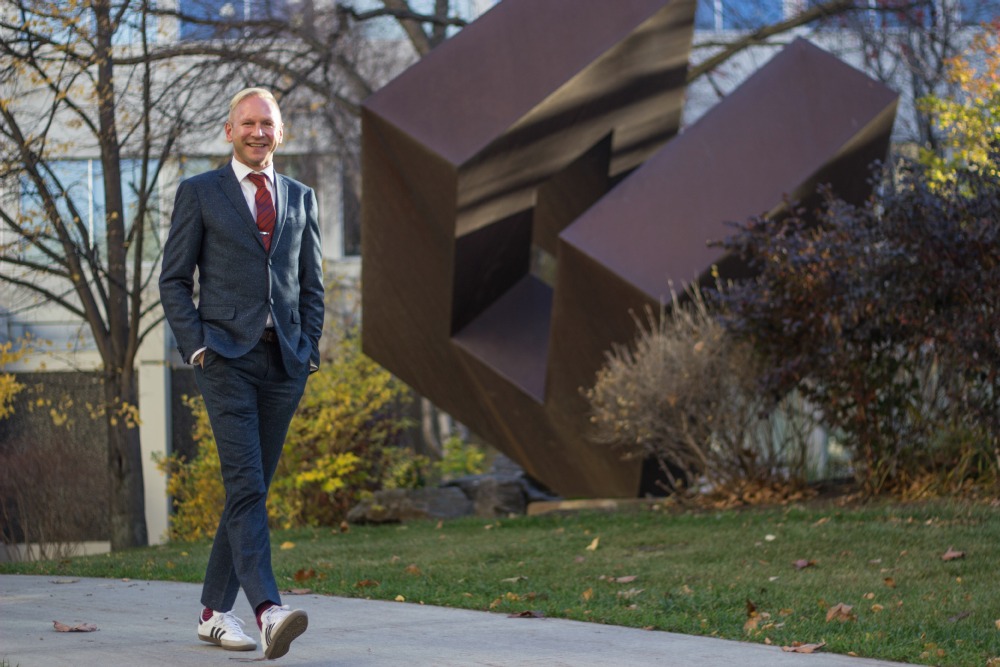Every weekday morning and afternoon, Randy Wimmer laces up his runners and does the 35-minute walk between downtown and the University of Alberta campus on the south side of the river.
Summer or winter, rain or shine, it is a ritual the thoughtful educator cherishes. “That’s my time—sometimes it’s my only time,” says Wimmer. Since taking on the role of interim Dean of Education on July 1, 2015, the former vice dean’s calendar has become increasingly busy—hence the importance of those daily walks to and from work.
Although Wimmer says the experience of becoming dean comes with an “extraordinarily steep” learning curve, he is not complaining. “Every day, I am reminded of the good people and the expertise around me in this faculty. If there’s anything I don’t know, I ask,” he says. He’s also eager to acknowledge the work done by the Faculty of Education’s department chairs, associate deans, and former deans, including Larry Beauchamp and Fern Snart. Having worked closely with Snart, he is committed to building on her legacy of inclusivity and diversity.
“Social justice, social policy—these issues are what’s at my core,” says Wimmer.
Experience and education
Asked about his priorities as dean of one of the top five faculties of education in Canada (and top 50 in the world), Wimmer talks about the need for better student engagement, the importance of preparing graduate students to be excellent academic citizens, and continuing to build on the faculty’s strengths in research and scholarship.
His focus, however, is on Aboriginal education and education in rural and northern communities—two topics that have played a significant role in his academic and personal life.
While pursuing his doctor of education (EdD) degree at UAlberta in the Department of Educational Policy Studies, Wimmer was offered a teaching assistantship. He was given the option of teaching either on the UAlberta campus in Edmonton or at Northern Lakes College in Slave Lake, Alta., as part of the university’s then-new off-campus collaborative Aboriginal Teacher Education Program (ATEP).
Wimmer chose to go north.
“Something drew me to that different experience,” he says. More than a decade later, he still describes it as “one of the most profound teaching experiences in my life.”
Having grown up on a farm, he knew what it meant to live in a small community, far from the city. And after completing his bachelor of education at UAlberta in the late ‘80s, he taught primary and secondary school students in a rural community in northern Alberta. But this was different.
His ATEP students were adult learners, mostly Aboriginal Canadians, with extensive life experience and worldviews that both resonated with and differed from his own.
A fan of pre-eminent educational theorist John Dewey and his writings on the importance of building onto students’ prior experiences, preconceptions, and knowledge, Wimmer would use the long drive between Edmonton and Slave Lake to reflect deeply on what he could do to better meet the needs of his ATEP students.
“I remember leaving class feeling intensely satisfied, but also wondering ‘Am I giving them what they need?’ I have never been so challenged by students—in a positive way—as I was by the students in ATEP.”
The way forward
“Alberta has the lowest rate of post-secondary education participation in the country,” says Wimmer.
“The government and post-secondary institutions need to place a high priority on increasing the number of Indigenous learners in post-secondary education. We also need to look at bringing in more students from northern communities, rural communities, and first-generation learners.”
Today, as UAlberta and universities across the country ask themselves tough questions about how to address Canada’s dark history when it comes to First Nations, Métis, and Inuit peoples and implement the Calls to Action recently put forth by the Truth and Reconciliation Commission (TRC), Wimmer is cautiously optimistic.
He looks forward to a cross-campus effort to respond to the TRC report by integrating Aboriginal ways of knowing into curriculum and pedagogy in every faculty. He also anticipates a renewed institution-wide focus on providing better access to education for Aboriginal students—something which UAlberta President David Turpin has named as one of his top priorities.
The Faculty of Education has taken several steps in the right direction on the path to reconciliation: there is the success of ATEP; the introduction in 2013 of EDU 211, Aboriginal Education and the Context for Professional Engagement, a mandatory course for all bachelor of education students; community initiatives focused on empowering young Aboriginal women; and most recently, the one-year appointment of Aboriginal scholar Eber Hampton as Academic Elder and Special Advisor to the Dean of Education.
As a non-Aboriginal teacher educator, researcher, and educational leader with experience in Aboriginal education, Wimmer is focused on learning from Aboriginal colleagues and students and working as an ally in the advancement of Aboriginal people and their education.
Currently, he’s working with fellow education professor and ATEP Director Evelyn Steinhauer of the Saddle Lake Cree Nation, on a research project funded by Alberta Innovation and Advanced Education focused on the experiences of beginning teachers who are ATEP graduates. “Before we start talking about culture change in the academy, we need to invite Aboriginal people to the table. We need to let them take the lead,” Wimmer says.
“Non-Aboriginal people need to work alongside Aboriginal people to best understand them. That doesn’t happen overnight, and it won’t happen by next term. We’ve got a long way to go.”
Prior to beginning his first term as interim Dean of Education in July 2015, Randy Wimmer served as Vice Dean of Education (2013-15), Associate Dean (2011-13), and Associate Chair in the Department of Educational Policy Studies (2010-11). He is also a professor in the Department of Educational Policy Studies. Before joining the Faculty of Education in 2006, he held a faculty position at the University of Saskatchewan in the Department of Educational Administration.
Feature Image: Interim Dean of Education Randy Wimmer photographed outside Education Centre, October 2015.
